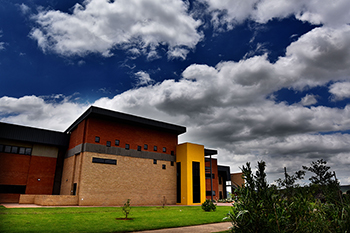
The new Physics and Geography Complex on the
Qwaqwa Campus is connected to the existing
Chemistry Building.
Photo: Charl Devenish
As a world-class tertiary institution, the University of the Free State (UFS) boasts with three new buildings on its Bloemfontein and Qwaqwa Campuses since 2015. All of these buildings are extensions to current buildings, supporting the university’s vision of excellence in academic achievement.
Extensions and additions to the value of R23 million were made to the existing Biotechnology Building. The funding was provided by the Department of Higher Education and Training. The additions were made to the southwestern corner of the existing building. Further developments to the building includes: six new offices, a lecture hall for 70 students, and laboratories accommodating 56 postgraduate students.
Prof Martie Smit, Academic Head of this department, says: “This new and refurbished facility enables us to give our best. As academics, we are committed to do our part in delivering high-quality education on both undergraduate and postgraduate levels to students envisaging a future in biotechnology.”
Dr Lis Lange, Vice-Rector: Academic, is proud of the heights the department has reached to date. “The Department of Physics is undoubtedly one of the jewels in the crown of our university, and we are very proud of its developments. Universities are built on legacies, and they are also about change, which is what this department has been demonstrating.”
The new Physics and Geography Complex on the Qwaqwa Campus is connected to the existing Chemistry Building. The building is the first of its kind on the campus and boasts an auditorium with 360 seats and a Geography Information System laboratory with 100 work stations.